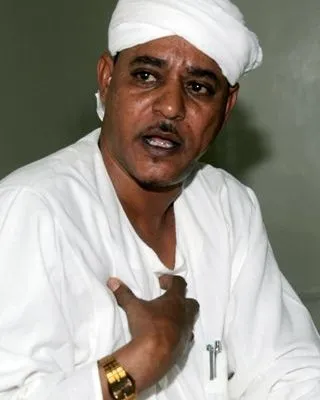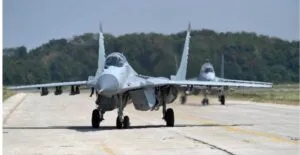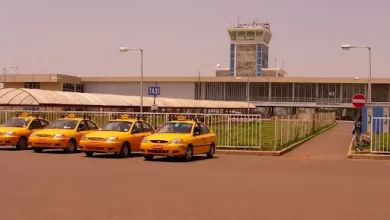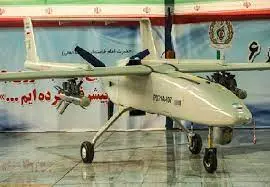Analysts associate diminished impact to
Musa Hilal's bias towards the army

Sudanese analysts share that the impact of the controversial tribal leader, Musa Hilal’s announcement of his support for the army in its war against the Rapid Support Forces, is of little consequence after remaining neutral since the outbreak of the conflict.
According to analysts, the announcement of the founder of the “Janjaweed” militia will not create much of an impact on the course of the ongoing war, especially since he harbors hostile sentiments towards the Rapid Support Forces that had previously arrested him in November of 2017. At that time, he was leading a military faction in Darfur, after the United Nations accused him of committing human rights violations in the distraught area.
In March of 2021, he was released from a prison in the capital, Khartoum, after a pardon was issued by the Sovereignty Council.
A belated feat
Political analyst Youssef Siraj El-Din shared, “Hilal’s choice to side with the army came late, well after the ongoing war had completed its first year without him adopting a clear position, at a time when the native administration in the Darfur region’s position was indicated to be in alignment with the Rapid Support Forces.”
Siraj El-Din told “Erem News” that Musa Hilal, who has announced his position on the war in conjunction with some Darfurian Movements that were choosing to abandon neutrality between the two parties to the conflict in Sudan, has launched a recorded speech that was shy and lacking in frankness.
He pointed out that some believe that Hilal’s statements are quite outdated, and that his position on the war was later revised.
A Reaction
Musa Hilal’s position on the ongoing war, siding with the army, received a violent reaction from his “Mahamid” clan, whose members announced the extremely opposing position, stressing that Hilal only represents himself, and they -the “Mahamid” Clan- are the origin of the “Rapid Support Forces.”
The notables of Musa Hilal’s clan stated, in a press conference held in El-Geneina, Western Darfur, that their position is to fight the war alongside the Rapid Support Forces until the very end.
A Reconsideration
Youssef Siraj El-Din shared that what Musa Hilal said received a significant reaction, and his speech was followed by storm of statements and press conferences of dissident movements from the Sudanese Awakening Revolutionary Council, which was founded by Musa Hilal himself.
He added: “I think this also had a big impact on the “Mahamid” clan (one of the Rezeigat tribe’s sub-clans), which is where most of the fighters in the ranks of the Rapid Support hail from.”
He pointed out that the press conference held by the “Mahamid” leaders was a sufficient response to prompt Musa to reconsider his positions.
He continued: “The reaction was greater than Musa Hilal’s speech, and much more than he expected,” stressing that the position Hilal took was not in the interest of the Darfur region.
Losing leadership
“He is no longer the leader he was before,” according to Darfur researcher Gedo Ahmed Talab, who suggested that Musa Hilal has lost his social and tribal standing in Darfur since 2019.
Talab added that Musa Hilal’s prominence as a tribal leader declined to the point of being considered as merely one of the elements of the former regime. That led to him losing his popularity and status in the “Mahamid” clan, which he had originally gained during the rule of former ousted President Omar al-Bashir. Therefore, due to the political and social awareness spreading among the social components in the states of Darfur, Hilal revealed the fact that he is “playing on two ropes, with the old and the new regime at the same time.”
An expected step
The widespread rejection that met Musa Hilal’s call to stand alongside the Sudanese army was to be expected, according to Talab, who affirmed what the “Mahamid” clan’s native administration had accomplished by rejecting Hilal’s position, and stated: “All the reasons that prompts them to reject Musa Hilal’s leadership were applicable.”
Speaking to “Erem News,” he attributed Hilal’s request to side with the army to what he termed “the longing to return to the embrace of the National Congress Party, and receiving money to nurture sedition as well as confront the Rapid Support Forces to prevent them from staking control over the city of El-Fasher.”
He reiterated the matter of Hilal’s star fading amongst his clan and the people of Darfur, for members of his tribe are field commanders within the ranks of the Rapid Support Forces.
Losing lustre
The specialist in Darfur affairs, Ali Al-Zein, took a different approach regarding Musa Hilal’s position, sharing that the impact of the announcement of his position in support of the army regarding the reality of the ongoing war, whether positive or negative, is of little consequence. Because Hilal lost his old tribal influence in the Darfur region.
Al-Zein inferred to “Erem News” the decline in the man’s popularity with the incident of his arrest by the Rapid Support Forces and his subsequent sentencing to years in prison, with no action whatsoever taken by his tribe or supporters, except for limited demonstrations from his family and grandchildren.”
The decisive blow
Political analyst, Osama Al-Amin, considered Musa Hilal’s choice to side with the Sudanese army and stand against the Rapid Support as more of a political than tribal move.
Al-Amin stated that the man got himself into a dilemma, regarding what he said about the state of polarization some army generals has succeeded in creating to bring about convergence of views.
He added: “Hilal put his positions up for sale a long time ago. He is the man who said that we and the National Congress government are working to reform the government of Sudan. He is the man who stood with Al-Bashir but the latter abandoned him.”
The prince of war
Al-Amin pointed out that Musa Hilal does not deny his bloody history in establishing the “Janjaweed” militia in Darfur before the region’s war, until he earned the title of “Warlord” in a war that claimed the lives of hundreds of thousands of Darfurians.
The United Nations placed Hilal on its sanctions list after he was accused of committing human rights violations and widespread atrocities against civilians during the war in Darfur, which claimed the lives of more than 300,000 people and displaced nearly 3 million people, according to UN reports.
Speaking to “Erem News,” Al-Amin shared that what Hilal did was inflamed by a historical grudge against the Rapid Support Commander (Hemedti); Because of Hilal’s arrest by the Rapid Support Forces, in the area of Mustariha, northern Darfur, in 2017, after he refused to comply with State orders in the weapons collection campaign.
Al-Amin speculated that what the man did would not carry further beyond what happened, stating: “On the contrary, his position has turned disastrous for him, after we witnessed the notables of the “Mahamid” clan reject Musa Hilal’s position.” A step that Al-Amin described as “a decisive blow” to the man, especially since the position of Darfur tribes is mostly in favor of the Rapid Support Forces; because of issues they consider to be fair.
He predicted that Hilal’s position would trigger a major crisis for the man, that began with his removal from the tribe’s leadership, in addition to well-known military leaders affiliated with the Sudanese Awakening Revolutionary Council, which he founded himself, announcement of joining the Rapid Support mere hours following Hilal’s speech regarding the matter of siding with the army.





